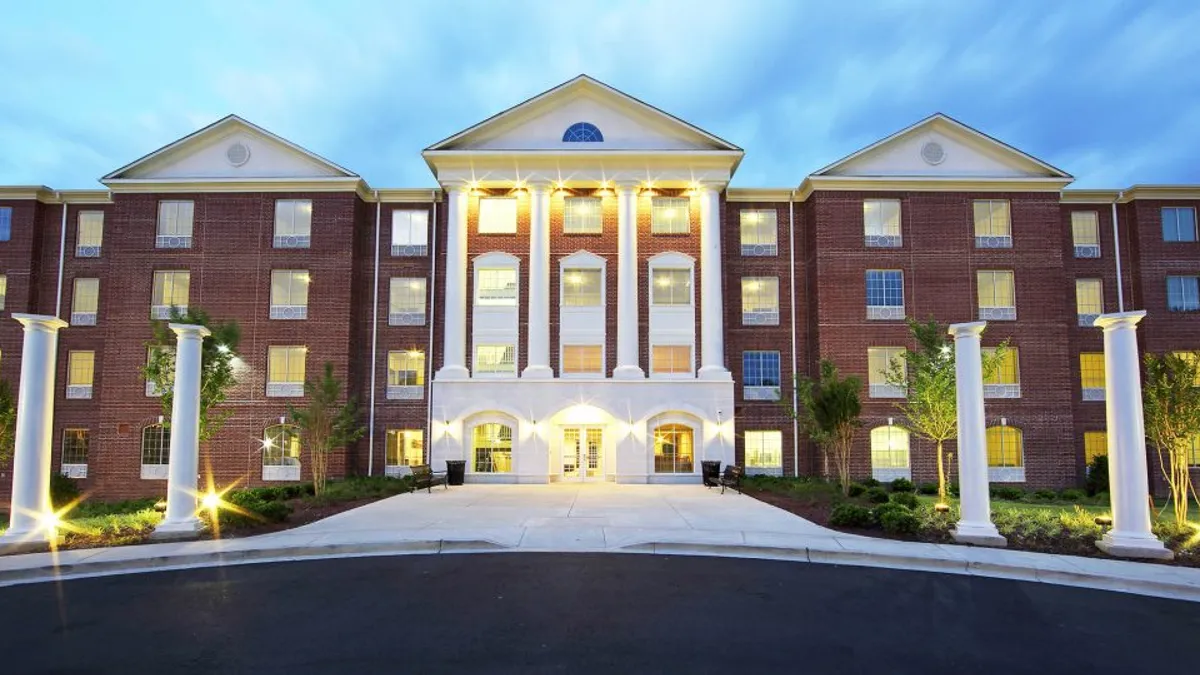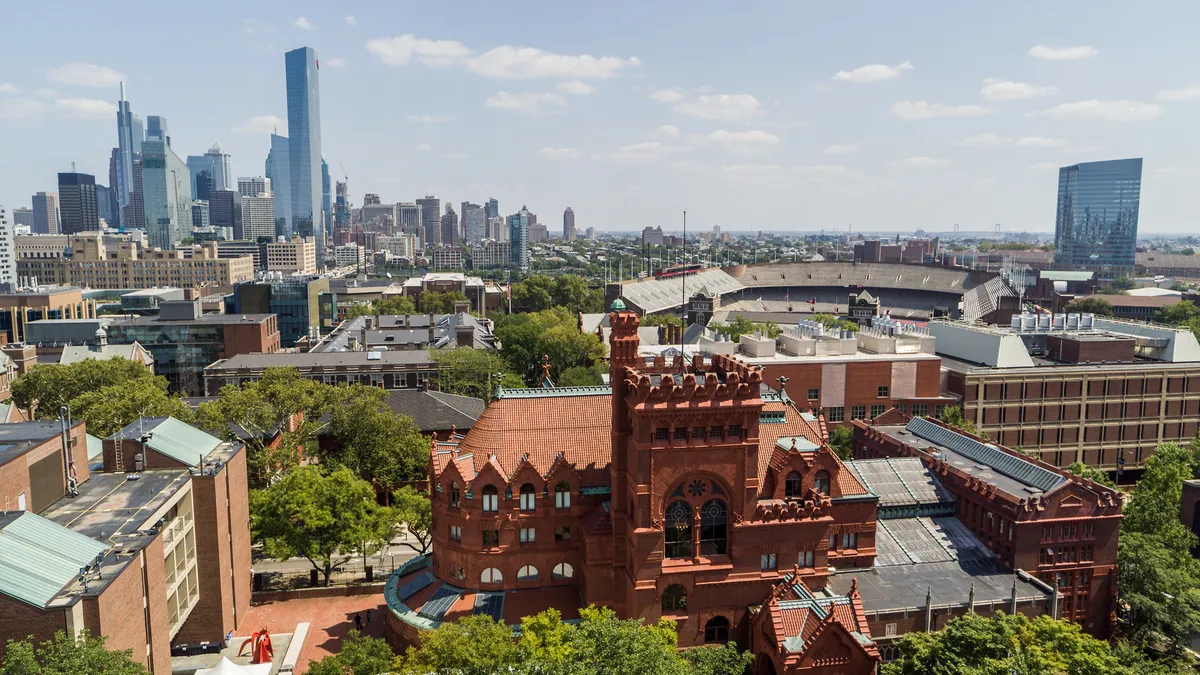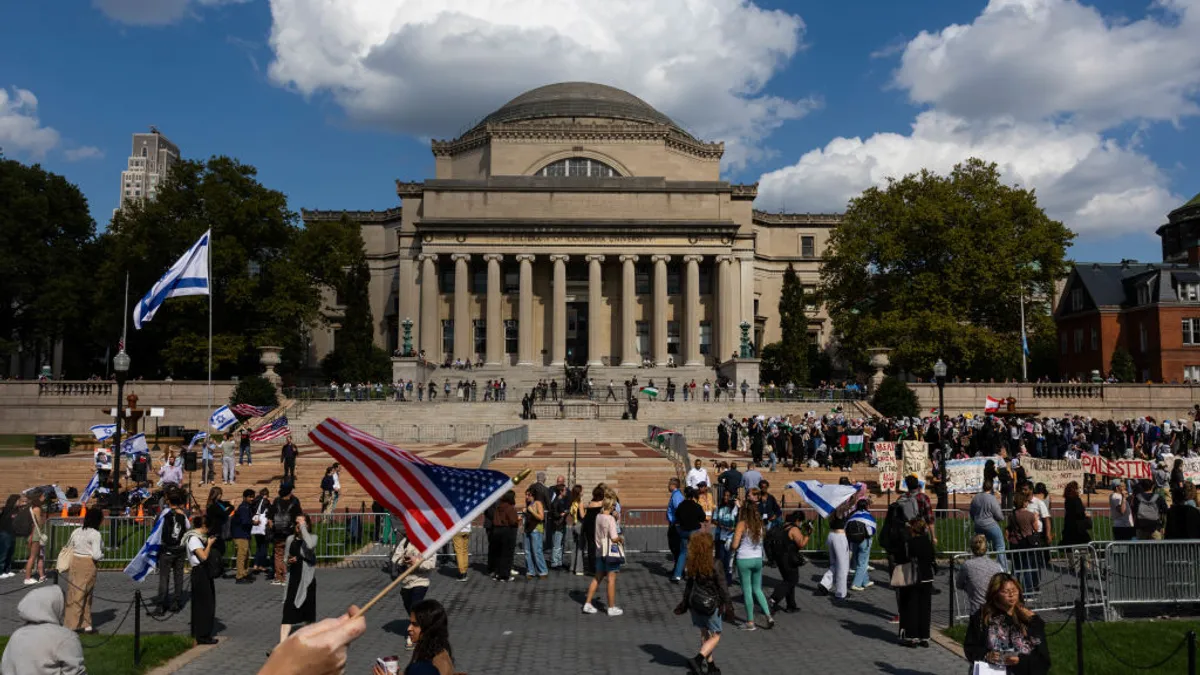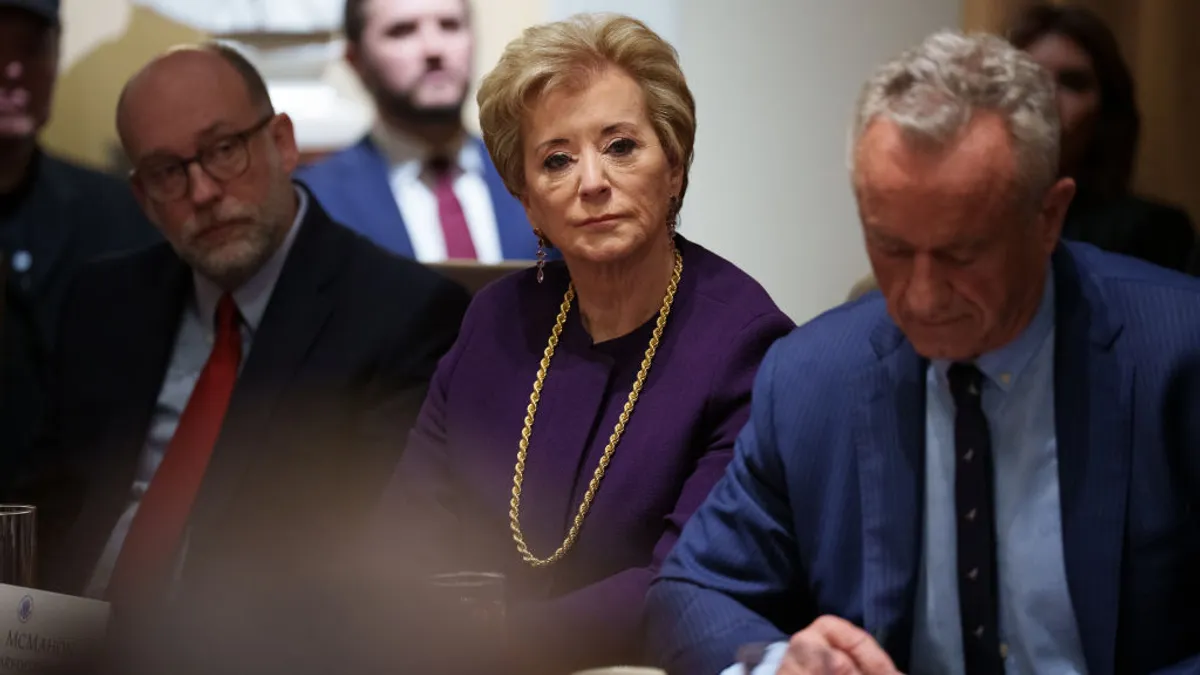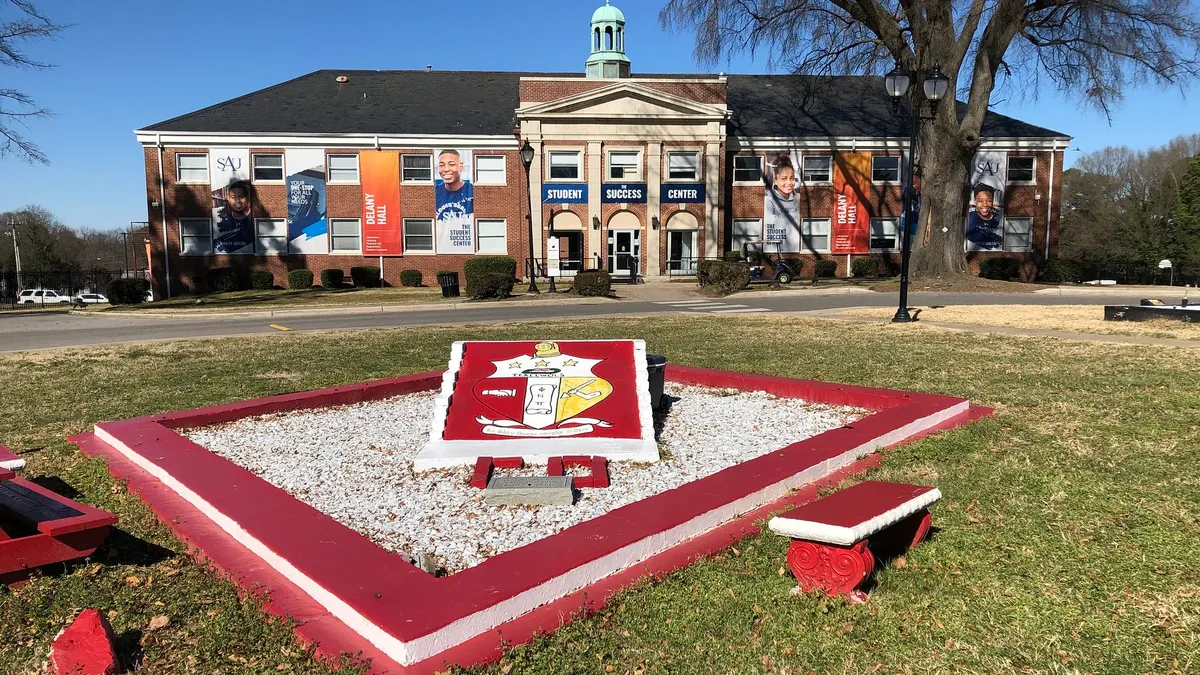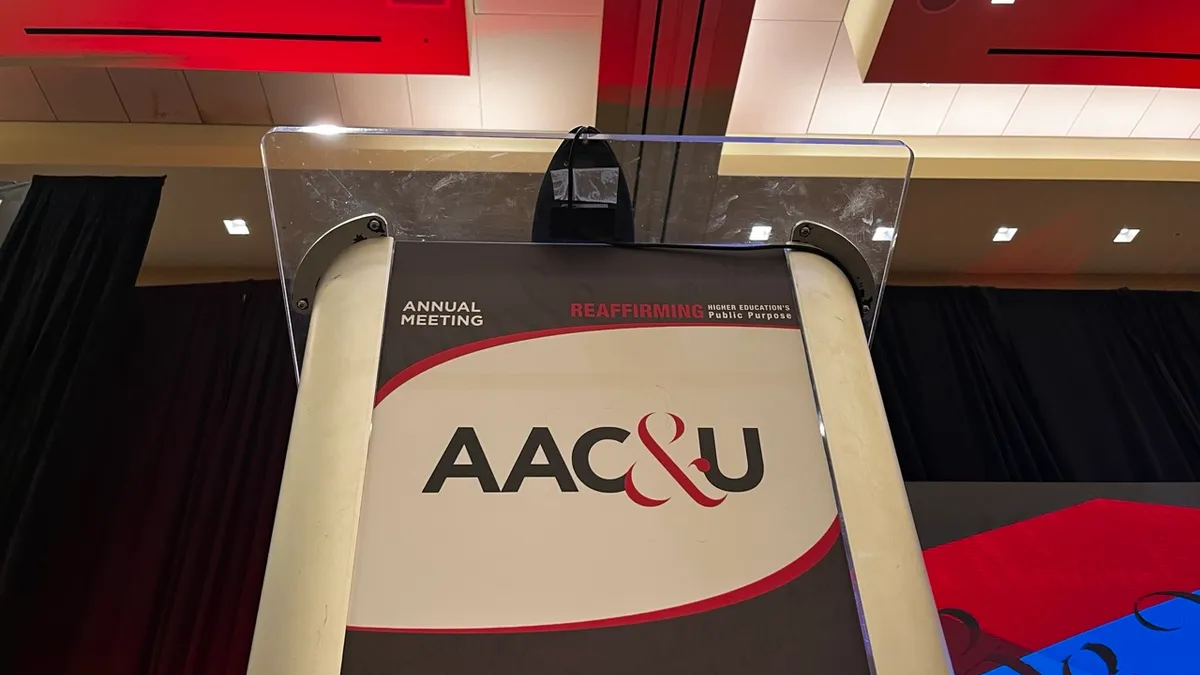Moved by the nationwide protests against racial inequity last summer, the Community Foundation of Greater Memphis wanted to find ways to address the issue in its own community and help lift the Tennessee city's most disadvantaged residents.
So the nonprofit created an unrestricted $40 million endowment for LeMoyne-Owen College — the largest gift the tiny private institution had ever received. For LeMoyne-Owen, a historically Black college, the gift was "transformational," said its president, Vernell Bennett-Fairs.
LeMoyne-Owen leaders are still figuring out how exactly they will use the money. But the gift dwarfed what had been its $12 million endowment, and it will allow leaders to expand programming and degree offerings, recruit new students, hire new faculty, offer more scholarships, grow its honors program and make needed infrastructure improvements, Bennett-Fairs said.
"It speaks to the value and importance of LeMoyne-Owen College to this community," Bennett-Fairs said. "It will impact the campus for years to come on so many different levels."
The gift is one of many massive financial investments made to historically underfunded HBCUs by billionaire investors, nonprofits and the federal government over the past year. The donations were given as the nation turned its attention to racial injustices, the pandemic put small colleges in financial peril, and HBCU graduate Kamala Harris was nominated and elected as vice president.
Those investments can mean big changes for HBCUs, which compete for students against well-endowed predominantly white institutions. In some cases, they can even mean an HBCU's survival.
Each large investment can have a cascading effect, inspiring other philanthropists to do the same, said Lodriguez Murray, senior vice president of public policy and government affairs at UNCF. The Community Foundation of Greater Memphis created the $40 million endowment for LeMoyne-Owen, for example, because that was the amount Netflix CEO Reed Hastings and philanthropist Patty Quillin gave to each of UNCF and HBCUs Spelman and Morehouse last June, the organization's president, Robert Fockler, said.
The Memphis foundation hoped the amount would allow the college to grow and develop instead of worrying about survival and serve what it considers "the most critical population in our community," Fockler said.
HBCUs are major economic drivers and have proven crucial to closing the racial wealth gap, financially propelling low-income Americans and sparking social change. But a long history of systemic racism has blocked access to the money needed to keep up financially with institutions that serve mostly White students. The lack of public support and the institutional wealth gap have existed since the emergence of HBCUs in the wake of the Civil War, through Reconstruction, the Jim Crow-era segregation of schools and the decades after.
The donations, Murray said, "certainly help" in closing the institutional wealth gap, though it's too early to tell if they will help HBCUs level up financially. More investment is needed, he added, and not just at notable HBCUs like Spelman and Morehouse, but also at lesser-known institutions such as Tougaloo College, in Mississippi and Talladega College, in Alabama.
HBCUs have "turned out some of the greatest minds and change agents that this country has ever seen," Murray said. "But with significant resources on par with what they produce for the country, the institutions would turn out even more."
'These are huge gifts'
It's hard to overstate how significant these philanthropic gifts and federal funding could be for an HBCU.
The new investments have allowed HBCUs to keep their doors open, finance scholarships, preserve their facilities and infrastructure, maintain their accreditation status, and fully or partially write off capital financing loans that institutional leaders have struggled to pay off due to the pandemic, said Titilayo Tinubu Ali, senior director of research and policy at the Southern Education Foundation.
The gifts have also drawn new attention and awareness to HBCUs and their needs, which could boost student interest, enrollment and donations in the future, said Terrell Strayhorn, director of Virginia Union University's Center for the Study of HBCUs.
Billionaire philanthropist MacKenzie Scott last year gave one-time gifts to nearly two dozen HBCUs, ranging from $4 million for Voorhees College, in South Carolina, to $50 million for Prairie View A&M University, in Texas.
At the start of 2020, Howard University, in Washington, D.C., received the largest gift at that point in its history: $10 million from billionaires Bruce and Martha Karsh to endow its STEM program. A year later, the HBCU Cultural Heritage Stewardship Initiative, through a collaboration of several charitable foundations, awarded more than $650,000 in grants to eight HBCUs to help preserve their historic campuses. Among them were Jackson State University, in Mississippi; Lane College, in Tennessee; and Benedict College, in South Carolina. And former New York City Mayor and billionaire Michael Bloomberg last September gave $100 million to four historically Black medical colleges to help cover students' costs.
Some of the large donations, such as those from Quillin and Hastings and the Cultural Heritage Stewardship, are restricted to specific purposes, like scholarships and facility preservation, UNCF's Murray said. Others that are unrestricted, like the Scott donations, give college leaders the leeway to address needs on their campus, he added.
While most of the donations are one-time gifts, they can inspire others to invest in HBCUs, which in a sense would make them recurring, Murray said.
Support for HBCUs at the federal level, meanwhile, has been bipartisan. Former President Donald Trump and a split Congress passed legislation that permanently restored $255 million in annual funding for minority-serving institutions, including $85 million for HBCUs. The annual federal funding expired months before the bill's signing in December 2019. President Joe Biden on the campaign trail pledged to invest more than $70 billion toward MSIs, including HBCUs.
The federal coronavirus relief packages also allocated money specifically to MSIs. The first, passed last March, earmarked $1 billion in relief for HBCUs and other MSIs. The second round of legislation canceled $1.3 billion in debt held by HBCUs and provided more than $1.7 billion in relief for MSIs, among other measures. And the latest relief package, signed into law earlier this month, set aside nearly $3 billion for MSIs.
Morgan State University, an HBCU in Baltimore that enrolls more than 7,000 students, has received a "transformational" amount of cash over the past year from several sources, said Sidney Evans, the institution's vice president of finance and management.
The 154-year-old public research university was awarded $40 million from MacKenzie Scott, $150,000 from the Cultural Heritage Stewardship, and just last month, $20 million from alum Calvin Tyler Jr., who added the money to a scholarship fund he previously created with his wife.
The funds, Evans said, will help Morgan State compete against other colleges, provide more scholarships to students from Baltimore, and launch social and economic initiatives throughout Maryland.
The Scott gift was put into a new endowment that will help Morgan State achieve goals it is setting through the development of a 10-year strategic plan, Evans added. Those could include enhancing student success, becoming a top-tier research university and establishing itself as an anchor institution for the city.
"It really doesn't get any better than this, to be honest with you," Evans said. "These are huge gifts that will enable Morgan (State) to advance its vision and mission and to meet the needs of our students."
More funding needed
The new investments are not a silver bullet for all the challenges HBCUs face.
They don't address systemic racism or the prejudiced perceptions that they are not as prestigious as other institutions, which hold HBCUs and their faculty and students back, said Strayhorn, who is also Virginia Union's provost and senior vice president of academic affairs.
And even with the windfall, the gap between the endowments of HBCUs and predominantly white institutions are canyon-sized. More than 100 U.S. universities had endowments over $1 billion last year. But the HBCU with the largest endowment, Howard University, had only around $700 million, according to data from the National Association of College and University Business Officers.
The national reckoning with systemic racism sparked after a police officer in Minnesota killed George Floyd, a Black man, by kneeling on his neck, moved organizations and donors to try to address inequities with financial support. Nearly a year later, the question remains: Will these new investments in HBCUs continue to build momentum and be sustained?
Although the surge in donations is significant, it is short-term, said Brent Swinton, vice president for institutional advancement at Bowie State, an HBCU in Maryland. His university needs to grow its small endowment "by an order of magnitude" to keep up with scholarship demands and student services beyond the pandemic, he said. That will require ongoing support.
"HBCUs have received far less funding than our peers for doing the same thing on the same scale," UNCF's Murray said, "and that means the funding that you've seen, the uptick of recent months is welcomed, it's necessary, and much more is needed to make up for 150 years of inequality."


